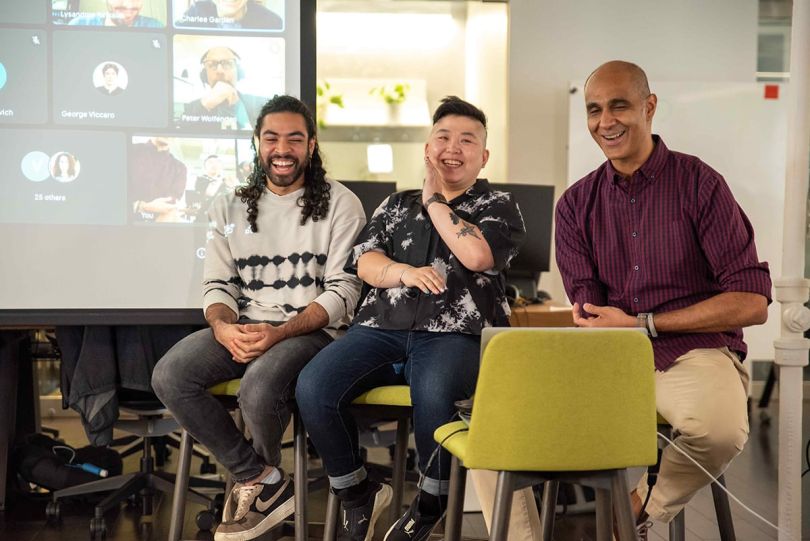A toddler takes their first wobbly, unaided steps.
A young child tells their parents they don’t need to be read to tonight — instead, they want to decipher those pages on their own.
A teenager’s hands keep a white-knuckled grip on the steering wheel, rolling down the road without a guiding voice sitting shotgun.
There’s a special triumph to being able to do things for ourselves; it spurs a feeling of accomplishment that can’t be matched by receiving guidance or instruction. It’s only natural to want that feeling at work — people dedicate quite a bit of their time and skill to what they do for a living. Whether it’s deciding where, when and how they work best or being able to make key decisions about projects, employees want to control their experience on the job.
And it doesn’t just make people feel good — increased autonomy at work leads to better results. According to research done by employee listening tool organization Effectory, increased agency over work leads to improved role clarity, engagement, commitment and adaptability.
Of course, complete decision-making power is not something that can happen right away or all the time — any new job requires training, guidance and teamwork. However, good training sets an employee up for future autonomy and good leaders are able to recognize when they can let go and give their team members the reins of their own workflow.
Built In NYC sat down with leaders from Alfred, Haven Technologies, Trialspark, Orum and Hiro to discuss their relationship to autonomy — what it means, how they got it and how it affects their career.
Alfred’s flexible work model gives Matt Maurer autonomy over when and where he works, and the resident services company encourages him to try new things — even if they don’t always pan out.
What does autonomy at work mean to you?
Autonomy in my work here at Alfred means that I have the options and the freedom to work in a way that suits me. Personally, I love to work from the office. I know that’s weird in this day and age, but I love to collaborate with my team and colleagues. I feel I’m more productive when around others and appreciate that Alfred offers a hybrid and flexible work model. I also have the freedom to move my daily schedule around to fit in my life and create my own schedule. This allows me to take advantage of doing things like scheduling a doctor’s appointment midweek, going to a friend’s birthday celebration or making a 6 p.m. yoga class.
How have you been able to build a satisfactory level of autonomy at your current employer?
Alfred is the only company I’ve worked at in the past 25 years that has allowed me to grow and create a path for myself. In 2021, after being asked by the GM of one of our building partners to produce some events for them, I identified a gap in what we offered to our partner properties and saw an opportunity to create a new business line for Alfred. I felt comfortable putting together a proposal for the new product we would offer as well as the role I envisioned creating in order to support the business. It was exciting to not only create a new role for myself but to help create an entirely new team. This is something that has stuck with me and that I constantly push my team to think about. If you recognize a potential opportunity or have a dream role, you shouldn’t be afraid to speak up and push for change.
It was exciting to not only create a new role for myself but to help create an entirely new team.”
How does your employer or manager support you in finding the autonomy you need in your career?
Each of my managers here at Alfred over the past three-and-a-half years has allowed me to try and fail. They’ve allowed me the space to be myself, introduce my own ideas, work out problems and learn from my mistakes. Each and every one of them has supported me when I needed help but never stood in my way. This type of autonomy has helped me reach new heights — both professionally and personally — that I never thought were possible. The autonomy we have here at Alfred leads to more collaboration within and across our different teams. We approach our work and any challenges we encounter with a high level of empathy and one goal in mind: to deliver the best resident experience and give people the time to be their greatest selves.

At Haven Technologies, a SaaS insurtech company serving the life, disability and the annuities industries, autonomy is earned by bringing solutions to the table. Even if the first solution isn’t always the correct one, it reflects a problem-solving mindset that shows that a person can be trusted to make big decisions.
What does autonomy at work mean to you?
Autonomy means the power to make decisions while being professionally and emotionally mature enough to recognize the weight of those decisions — including the impact they will have on your colleagues, team goals and the broader organization.
Recently we had to stand up a new laptop security program. This program would impact every single person in our organization and their ability to work on a day-to-day basis. I had the autonomy to figure out how we were going to accomplish this — including setting up controls and subsequently monitoring, figuring out offensive and defensive testing, developing a security operations center with a vendor and more. While I had an amazing team by my side, I was 100 percent responsible for the success of the program. This autonomy and responsibility is what drove and motivated me — and I’m happy to share that the team did a fantastic job.
How have you been able to build a satisfactory level of autonomy at your current employer?
I say you have to crack some eggs to make an omelet.
What I mean by this is simple. I’ve gained autonomy and leadership opportunities at Haven Tech by learning to come to the table with solutions, not just problems. As a result, I have been given the space to try and implement those solutions, refine and adjust, with the full support of my team. Sometimes what I’ve recommended are the right solutions, and sometimes we hit a wall. But, by being proactive, I’m always afforded the autonomy to problem-solve and am never forced into someone else’s way of doing things — recognizing, of course, that the best ideas can be someone else’s.
In turn, I work hard to run my team with this same mindset — proactivity develops autonomy. Ultimately, I know that if I can equip someone to do my job, I can work toward my next big thing. This has a trickle-down effect and means my team can also keep striving for whatever is next for them.
I’ve gained autonomy at Haven Tech by learning to come to the table with solutions.”
How does your employer or manager support you in finding the autonomy you need in your career?
As chief information security officer, I operate with much autonomy. But, in reflecting back on my journey to becoming CISO, one of the most effective ways my managers were able to help me find autonomy was by knowing when it was the right time to get involved and when it was time to step back and let me iterate.
What I’ve come to learn from this is that it takes a certain emotional maturity and professional experience for autonomy to be done right. For a new hire, someone just starting their first job out of college or when taking on a new role, a manager being completely hands off in the name of employee autonomy can actually backfire. The best managers know that autonomy is an end goal, and everyone’s road to achieving it looks a little different.
For Ruben Atilho, manager of investments and business development at pharmaceutical drug development company Trialspark, autonomy is fueled by transparency. If team members communicate their successes and failures, then the whole team is empowered in their decision-making.
What does autonomy at work mean to you?
For me, autonomy in the workplace means I have the ability to fully control my work situation in a way that allows me to perform at my best. There are many factors that contribute to autonomy, but the key areas that are really important to me are having full end-to-end ownership of how I approach my projects and having a voice in the team goal-setting process.
As part of the business development team, I juggle a long list of responsibilities, from keeping up with new developments in medicine to developing relationships with potential business partners over Zoom or at conferences. At TrialSpark, having the autonomy to lead and design my own work plan and not be micromanaged makes me feel empowered to produce creative, high-quality work.
How have you been able to build a satisfactory level of autonomy at your current employer?
Building a culture of trust and communication with my team was vital for building autonomy at work. Whether it’s proving you can deliver great work on time or being transparent when there are unexpected bottlenecks that slow progress, actions like these help create trust — which is needed in an autonomous workplace.
Also, developing an ownership mindset and a strong sense of responsibility for the final outcome empowered me to make more day-to-day decisions on how, when and where I carry out my work. Knowing I am in the driver’s seat makes me feel more engaged and, ultimately, more motivated at work.
Communication and transparency create trust — which is needed in an autonomous workplace.”
How does your employer or manager support you in finding the autonomy you need in your career?
TrialSpark provides me with lots of benefits, resources and tools to support me in finding the right amount of autonomy I need in my career. This includes benefits and resources such as flexible time off to recharge and take care of personal matters, yearly professional development stipends to attend workshops on business development and a hybrid work environment that helps me manage my work-life balance.
An important part of building autonomy is celebrating our accomplishments. At TrialSpark, this can come in the form of celebrating success and giving employees recognition during our weekly company All Hands meetings or having a team dinner after meeting a major milestone such as closing a new deal!
Intelligent payment platform Orum takes autonomy beyond flexibility — employees are given the chance to find new solutions, prioritize problems and communicate clearly with managers.
What does autonomy at work mean to you?
In general, people think of autonomy as flexibility — but at Orum, we have the ability to go beyond that. Money movement is a really complex problem with no defined path. A few ways I’ve found autonomy are by finding new pathways to solve problems and contributing to defining Orum’s roadmap.
How have you been able to build a satisfactory level of autonomy at your current employer?
For me, autonomy has grown as we’ve understood our mission. As that’s happened, we’ve been able to identify problems and have the flexibility to choose the problems that are most important.
Autonomy has grown as we’ve understood our mission.”
How does your employer or manager support you in finding the autonomy you need in your career?
We recently started using a platform for our check-ins that has allowed us to have more effective conversations with our managers. This makes it easier to voice how I’m feeling and what I’m most interested in working on, as well as where I see my career growth at Orum.
The Stacks ecosystem, within which Hiro operates, is a community of independent entities and developers. Independence and autonomy are valued in the overall community, and that extends to Hiro as an organization — employees are given the chance to take the lead as they develop new tools for Bitcoin innovation.
What does autonomy at work mean to you?
One important dimension of autonomy for me is the ability to take on an ambiguous project and come back with an analysis of what is wrong — along with potential solutions or even prototypes for potential solutions.
This was exemplified recently with the launch of a new blockchain component. I was able to take the lead on profiling the current solution, identifying bottlenecks and prototyping solutions. This autonomous project has had a lot of impact so far, and it is interesting to work on a project without a clear solution.
How have you been able to build a satisfactory level of autonomy at your current employer?
One key prerequisite to acting autonomously was obviously to learn the system well enough that my ideas were actually consonant with how the overall system works. Beyond that, I just needed to identify a problem area and pitch it to the team.
How does your employer or manager support you in finding the autonomy you need in your career?
Hiro encourages senior engineers to take as much autonomy as possible. We are supported in finding problem areas that are the highest leverage, as well as the approaches to problems that are the quickest to prototype.














